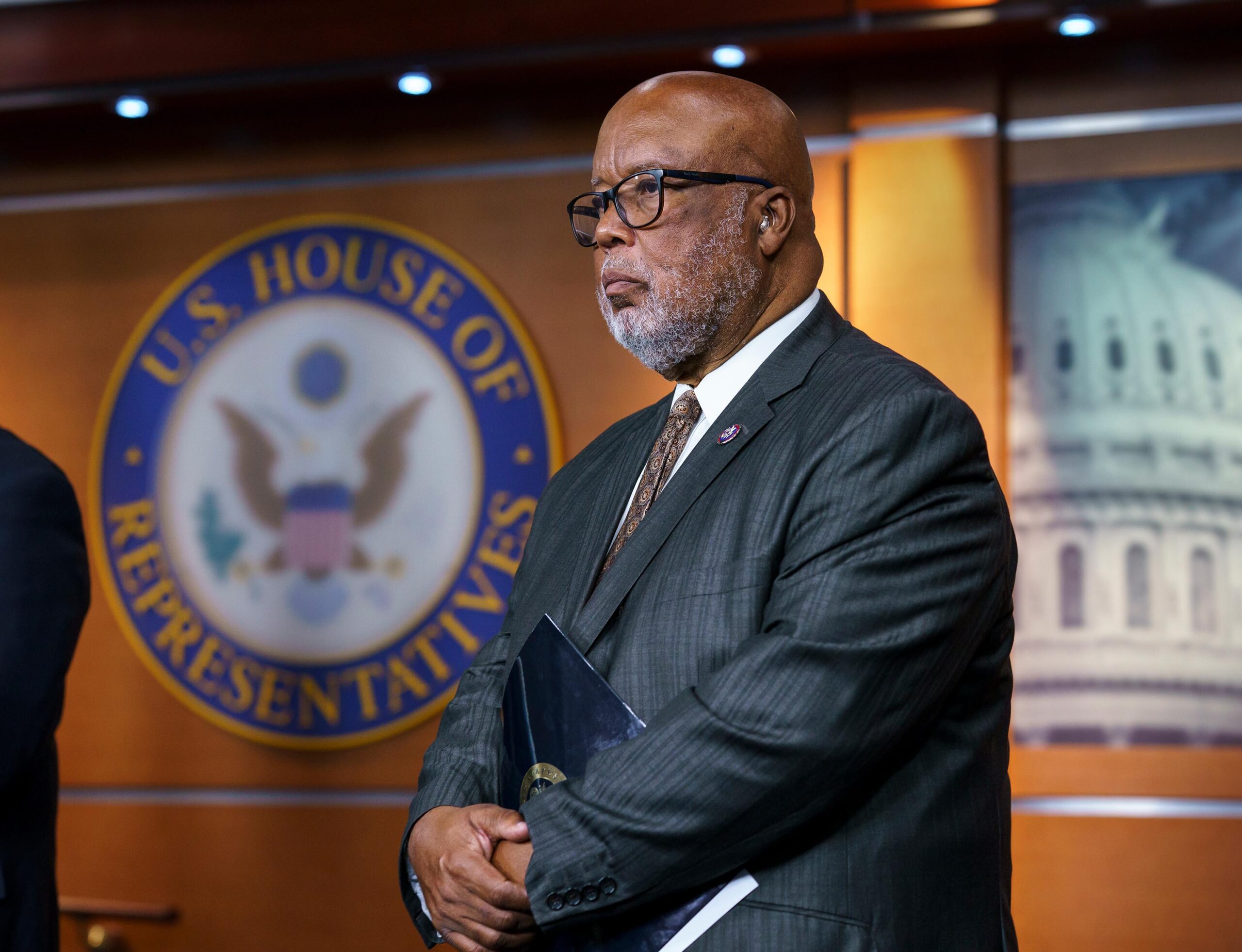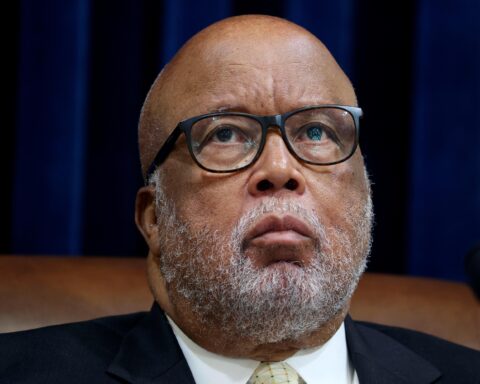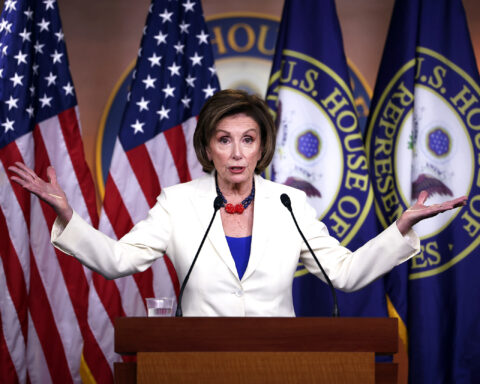House Homeland Security Committee Chairman Bennie Thompson avoids making too many promises when it comes to his new select committee to investigate the deadly insurrection at the US Capitol.
But the Mississippi Democrat is sure on one thing: He isn’t going to let the pressure of an election cut his investigation short, even if that takes it well into next year.
“I would say that we’ll do this work as long as it takes to complete it. Flexibility is important, if we run into significant resistance, then obviously it will take longer,” Thompson said in an interview with CNN. “I would love to say we would be able to finish it within a reasonable period of time. But for those of us who had a ringside seat on January 6, it was very damaging to the worldview of who we are as Americans. And we have to fix that worldview.”
The 14-term congressman spent months trying to hammer out an agreement for a bipartisan commission to examine the January 6 attack on the Capitol, only to watch a carefully crafted deal fall apart in the Senate thanks to GOP opposition.
Now, the 73-year-old Thompson is taking the helm of a select committee to tackle the January 6 investigation in the House at a time when the relationships on Capitol Hill are frayed, tensions are high, and as some of his Republican colleagues have denied the grim realities that defined the day altogether. Aides and fellow members are well aware the potential for the select committee to become little more than a forum for political jousting, but the same people say Thompson is uniquely positioned to succeed, approaching his new role armed with a reserve of bipartisan relationships, experience in investigating domestic terrorism and the temperament and patience that getting to the bottom of what unfolded on January 6 may require, even if it drags on for a year or longer.
Thompson may also have to defend against attacks of his own partisanship. In 2005, Thompson was one of roughly 30 Democrats who voted to invalidate the election results from the state of Ohio when President George W. Bush was elected. That vote, which is similar to one that dozens of Republicans took in the hours after the insurrection, could open him up to attacks.
Thompson says he has no regrets about his vote.
“You know, I cast votes based on what the issues are at that time. But again, I didn’t tear up the place because I cast a vote,” he told CNN.
For Thompson, the fraught months ahead will be built on a career spent on the Homeland Security Committee and defined by the fallout from devastating events like Hurricane Katrina and the September 11, 2001, terrorist attacks. This time, however, Thompson recognizes his investigation may force him to question his own colleagues and a former President who was the target of Democratic investigations for years and still has a loyal following on Capitol Hill.
“No one is exempt from the review of our committee. And without saying, ‘We will do this to former President Trump,’ or some other individual, I will trust the professional investigation that will be conducted. I will trust the people who are tasked with the responsibility of a deep dive into the scope and circumstances that got us to January 6,” Thompson said. “And if in fact they bring to us that information, that says ‘you need to do this,’ there is absolutely no reluctance on my part as chair to issue the subpoena.”
Challenges Thompson will face leading the committee
Thompson has his work cut out for him. He has to chart out the start of an investigation without knowing whether and who House Minority Leader Kevin McCarthy will appoint to his select committee — and whether McCarthy will appoint Republicans who have sought to whitewash the violence that occurred at the Capitol on January 6.
Thompson will also have a Republican on his side of the dais, after Pelosi appointed GOP Rep. Liz Cheney of Wyoming to the committee. It could make for some awkward dealings with the five Republicans picked by McCarthy who called Cheney’s decision to accept Pelosi’s appointment “shocking” and unprecedented.”
Thompson will have to defend himself and his committee’s work against a barrage of members and pundits who will argue from the outset it is doing little more than trying to attack former President Donald Trump and his followers.
“He’s the only Democrat in the Mississippi delegation, so I think he knows how to deal with members of the other party, and he takes the long view of American history, so he sees this in the context of a recurring struggle with domestic, violent extremism that American democracy has to deal with,” said Rep. Jamie Raskin, a Maryland Democrat on the select committee who was the lead impeachment manager during Trump’s Senate impeachment trial earlier this year.
“He is not going to be deterred by any members appointed to the committee who think they’re going to turn this into a partisan food fight,” Raskin said.
For his part, Thompson said he plans to take GOP attacks in stride even if they happen in his hearings.
“I have no problem working with my Republican colleagues. I have developed what I think is a reasonable temperament in trying to get things done,” Thompson said. “I tend not to be a bomb thrower. I give people on my committee the opportunity to express their opinion. If they want to spend their five minutes being stupid, that’s to the detriment of the constituents they represent, but we go forward.”
A career tied to homeland security
For more than 25 years, Thompson served as a volunteer firefighter in Mississippi, a role he has said has always shaped the way he looks at responding to tragedies and explains one of his earliest decisions as the chairman of the select committee — to bring in rank-and-file police officers to testify, which is expected for the new panel’s first hearing later this month.
So far, much of the testimony on the Capitol Hill has centered on what leadership knew, but Thompson’s decision to hear directly from officers should be seen as an early indication of how his committee is going to conduct its work, he said.
“We’ve always talked to the brass or the people who would have been in charge on that day who are no longer with the Capitol Police, but we’ve not talked to the Capitol Police — the people who were sprayed with bear spray, the people who were called the N-word, the people who were called traitors. They need to tell our committee what they experienced,” Thompson said, adding he’d also like to hear from congressional staff at another hearing. “We think it’s instructive for the committee to hear, but also it sets the right tone for why it’s so important that we do this work.”
Thompson has served as the top Democrat on the Homeland Security Committee since it became a full committee in 2005. The biggest lesson he’s learned there, he says, is that when it comes to threat against the United States, enemies rarely care about whether there is an “R” or “D” before your name.
“Our experiences say that when people want to harm us, they don’t ask party affiliation, they don’t ask what part of the country you’re from, they don’t ask your gender, or anything like that — they just want to harm Americans. So it’s been our philosophy that since we have to protect American from foreign and domestic terrorists so to speak then it is in our best interest to be bipartisan,” Thompson said.
His Republican colleagues have echoed that sentiment.
“While we don’t agree on everything, Bennie and I have developed a strong working relationship. He’s a good man, a patriotic American, and together we’ve been able to find common ground on many important issues,” Top Republican on the Homeland Security Committee John Katko told CNN in a statement.
Members also point out that Thompson has been talking about domestic terrorism, the threats it poses and the power of those groups to inflict terror on the American public long before it was seen as a serious area of inquiry as it is today.
“When we’d talk about that in committee, Mr. Thompson would always turn it and say we need to look inward because there are issues in this county where the threat is greater,’ said Democratic Rep. Donald Payne of New Jersey, who serves on Homeland Security with Thompson. “He made sure that was one of the major topics of his discussion as the leader of Homeland Security” even when Payne said Thompson’s efforts were “falling on deaf ears.”
A hard fought slog to create a commission
The Mississippi Democrat worked tirelessly for months to get a bipartisan deal with Katko, his Republican counterpart, in the hopes that buy-in from both parties would create legitimacy for whatever a bipartisan commission found.
Democrats say that Thompson’s relationship with Katko, both on the Homeland Security Committee and in reaching the commission agreement, shows how he’s managed build up bipartisan relationships on the Homeland Security Committee even when it’s tackled politically fraught issues.
“The fact that he was able to work with Rep. Katko to come up with the framework that was agreed upon for the nonpartisan commission … I think is a very good sign for the way they’ll handle this going forward,” said Rep. Elaine Luria, a Virginia Democrat on the select committee. “I think he’s really going after the facts, something he’s done for a very long time in Homeland.”
When the commission deal fell through, largely due to last minute disapproval from House Republican leadership and mass exodus of support in the Senate, Democrats say House Speaker Nancy Pelosi was left with no choice but to reverse course and create a select committee — and all the political landmines that come with an investigation run and controlled by Democrats.
“We all know that this is a second-best option” said Michigan Rep. Elissa Slotkin, who chairs one of the Homeland Security subcommittees under Thompson.
‘He’s very unflappable’
Thompson’s colleagues describe him as matter of fact, empowering and not interested in using public hearings or television interviews to advance his own career.
“I’ve always been impressed with him, just how thoughtful he is, how pragmatic, and what a straight shooter he is,” said Rep. Adam Schiff, the chairman of the House Intelligence Committee and a member of the select committee. “He’s very unflappable, and I’ve never seen him lose his temper or anything, or be anything but reasonable, thoughtful, pragmatic, and smart.”
Behind closed doors, colleagues say Thompson doesn’t offer detailed instructions or expectations, but trusts in his colleagues own abilities and instincts to conduct themselves appropriately and pursue lines of questioning they have expertise in.
“He is what you would hope for in a committee chairman,” Slotkin told CNN. “He is serious and experienced, but he also allows people on his committee, like myself, to take leads on things that are important to us. You know a lot of my peers, complain about their committee chairman or chairwoman, who don’t let them do anything.”
Payne views Thompson as a “major role model,” describing his colleague and friend as a “serious, no nonsense” leader whose “integrity and character are second to none.”
“I respect him immensely” Payne, who also is a part of the Congressional Black Caucus with Thompson, said of Thompson. “He took me under his wing when I arrived to Congress and since he served with my father he looked out for me.”
Rep. Val Demings, a Florida Democrat who serves with Thompson on the Homeland Security Committee, described the Mississippi Democrat as a mentor, saying he’ll be successful in the role because he’s not going to be consumed with the politics of the day.
“Bennie Thompson is always cool and collected. He has this little sense of humor that just helps to lift me up whether we’re in committee meetings or on the House floor having a private informal conversation,” Demings said. “He’s on the world stage right now, but it’s not a place he sought. … The facts don’t change if you have five sets of eyes or millions on them, and if he just does what he does best — and that’s to get to the truth, do this investigation, give it everything he has — I know he will.”







